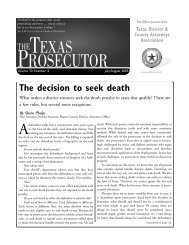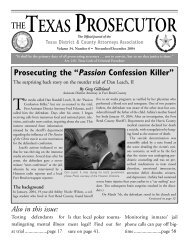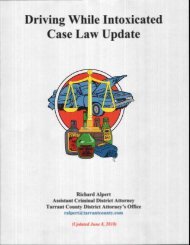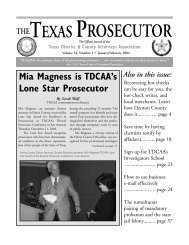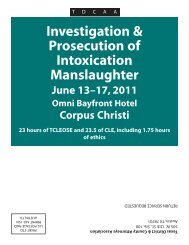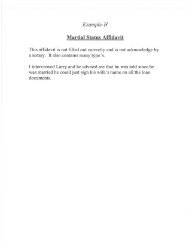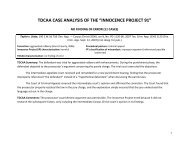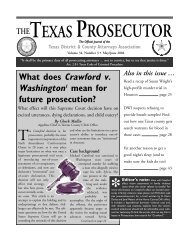Driving While Intoxicated Case Law Update - Texas District ...
Driving While Intoxicated Case Law Update - Texas District ...
Driving While Intoxicated Case Law Update - Texas District ...
You also want an ePaper? Increase the reach of your titles
YUMPU automatically turns print PDFs into web optimized ePapers that Google loves.
2. NO EVIDENCE THAT ADDITIONAL WARNING ACTUALLY COERCED<br />
DEFENDANT<br />
<strong>Texas</strong> Department of Public Safetv v. Rolfe, 986 S.W.2d 823(Tex.App.-Austin 1999, no pet.).<br />
Officer admitted (hypothetically) to telling suspecf, when asked, that if she refused to give a sample<br />
she would be jailed. Held that consent to breath fesf was still valid absent any evidence that this<br />
additional warning actually coerced suspecf into submifting to a breath test.<br />
3. NO EVIDENCE THAT DEFENDANT RELIED UPON EXTRA WARNING<br />
Ewerokeh v. State,835 S.W.2d7g6(Tex.App.-Austin 1992, pet. ref'd).<br />
Officer telting defendant "if he failed test he woutd be jailed," found not to be coercive where there<br />
was no evidence that defendant relied on this incorrect statement.<br />
4. DEFENDANT GAVE SAMPLE, CONSEQUENCES UNDERSTATED<br />
Franco v. State, 82 S.W.3d 425 (Tex.App.-Austin 2002, pet. ref'd).<br />
After being arrested for DWI, the defendant was read the standard lexas Transportation Code<br />
Ann. 724.015 admonishments as fo fhe consequences of refusing to give a sample. He gave a<br />
sample and then argues that he should have been read the admonishments under <strong>Texas</strong><br />
Transportation Code Ann. 522.103(a) as he also holds a commercial drivers license. The<br />
commercial consequences of a refusal are harsher than those for non-commercial holders.<br />
Without addressrng whetherthe failure to read him the additionalwarning was a mistake, the Court<br />
holds that he has failed to show he was coerced. Specifically, the Court holds "(The<br />
defendant)......cannot plausibly argue that his decision to take the breath fesf was induced or<br />
coerced by the officer understating the consequences of a refusal."<br />
SEE also Curlv. State,lgg4wl 33757096 flex.App.-Corpus Christi 1999, no pet.).<br />
5. AT MTS IT IS THE DEFENDANT'S BURDEN TO SHOW CONSENT TO<br />
GIVE BT WAS NOT VOLUNTARY<br />
State v. Amava, 221 S.W.3d 797 (Tex.App.-Fort Worth 2007, pdr ref'd).<br />
This involved a claim that the breath fesf was not voluntary because the warnings were read in<br />
English and only ttte written copy given to the defendant was in Spanrsh. The trialjudge concluded<br />
that because the statutory warning was not read in the Spanish language and because we do not<br />
knowwhetherthedefendantcouldreadthe Spanrbh warning sheef, wehavenowayof knowing<br />
if the defendant understood, or at least substantially understood, what the officer was telling him.<br />
The trial judge suppresse d the breath fesf resu/fs. The Court of Appeals reversed the trial coLtrt,<br />
finding it was the defendant's burden to point to some evidence rebutting the presumption arising<br />
75



